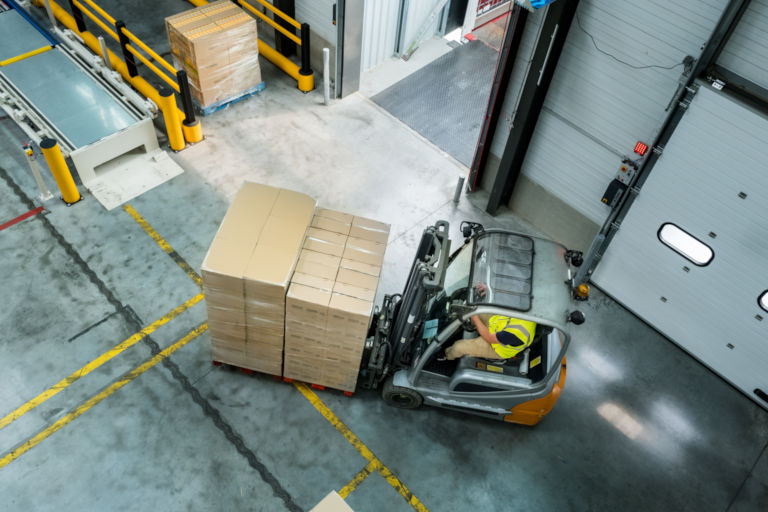Forklift Safety: Smart Moves that Prevent Serious Accidents
Request Free Consultation
Operating a forklift may seem routine for experienced workers, but every trip across the warehouse floor carries real risks. Each year, thousands of workplace injuries involve forklifts, often because of small mistakes that lead to very big consequences. Whether you’re a seasoned operator or new to the job, these essential forklift safety tips can help you protect yourself and those around you.
Perform Thorough Pre-Operation Inspections
Before starting any shift, take time to perform a pre-operation inspection. Check tires, brakes, lights, steering, and the horn. Look for fluid leaks and test the lift and tilt controls. If something doesn’t look or feel right, tag the forklift out of service and report the issue immediately. A quick inspection can prevent a dangerous mechanical failure later on.
Prohibit Passengers and Horseplay
Forklifts are designed for one operator only. Never allow passengers and avoid any kind of horseplay. Extra riders or unsafe behavior can throw off the forklift’s balance and create serious injury risks. Treat every trip as a professional responsibility and not an opportunity for shortcuts or stunts.
Be Cognizant of Foot Traffic
The Occupational Safety and Health Administration (OSHA) emphasizes that forklift operators must always yield to pedestrians, drive slowly, and use the horn in areas where foot traffic may be present. Pedestrian collisions are among the deadliest workplace accidents involving powered industrial trucks. Maintain a clear view at all times, use a spotter in blind spots, and communicate verbally or through signals with coworkers. Awareness and communication can prevent devastating outcomes.
Obey Speed Limits and Workplace Regulations
Speeding or rolling through intersections in a warehouse can have tragic results. Always follow posted speed limits and on-site traffic rules. Remember that industrial spaces often combine heavy equipment and human movement, so a few extra seconds of caution can make the difference between safety and injury.
Be Aware of Environmental Hazards
Your surroundings can change throughout the day, so constant awareness is key. Watch for uneven surfaces, spilled materials, dock edges, low clearances, and cluttered aisles. Even a small obstacle can cause a forklift to tip or a load to shift. Always slow down in high-traffic areas and honk at intersections to warn pedestrians and other operators.
Follow Load Capacity Limits
Every forklift has a rated lifting capacity shown on its data plate. Never exceed that limit. Overloading can cause the forklift to tip or lose steering control, endangering the operator and others nearby. Make sure loads are balanced, stable, and properly secured before moving. When in doubt, reduce the load and make multiple trips instead of risking a single overloaded lift.
Maintain Clear Visibility
If your view is blocked by the load, drive in reverse to maintain visibility. Use mirrors and spotters when navigating tight spaces or crowded areas. Clear sightlines are critical to avoid collisions with racking, equipment, or coworkers. Always make eye contact with pedestrians before moving near them.
Park Safely When Unattended
When leaving a forklift unattended, lower the forks to the floor, set the parking brake, and turn off the power. If the forklift is parked on an incline, chock the wheels. Never leave the engine running or the load elevated. A parked forklift should always be in a stable, safe position.
Exercise Caution Around Docks and Ramps
Docks and ramps pose unique challenges due to limited visibility and heavy pedestrian activity. Drive slowly, watch for gaps or uneven transitions, and keep your load stable. Always verify that dock plates are properly secured before crossing.
Report and Prevent Workplace Accidents
Even with proper training, accidents can happen. If you or someone you know has been injured in a forklift-related incident, understanding your legal rights is crucial. A qualified attorney can help determine whether negligence, lack of training, or unsafe workplace conditions contributed to the injury, and can assist in pursuing compensation.
Stay Alert. Stay Safe
Forklift safety depends on awareness, responsibility, and consistent habits. By inspecting equipment, obeying safety rules, and staying aware of your surroundings, you help create a safer workplace for everyone.
If you’ve been involved in a workplace accident involving a forklift or other industrial equipment, The Floyd Law Firm is here to help. Our experienced attorneys can guide you through your legal options and fight to protect your rights.
Contact The Floyd Law Firm today to schedule a consultation and learn more about your options after a workplace injury.

